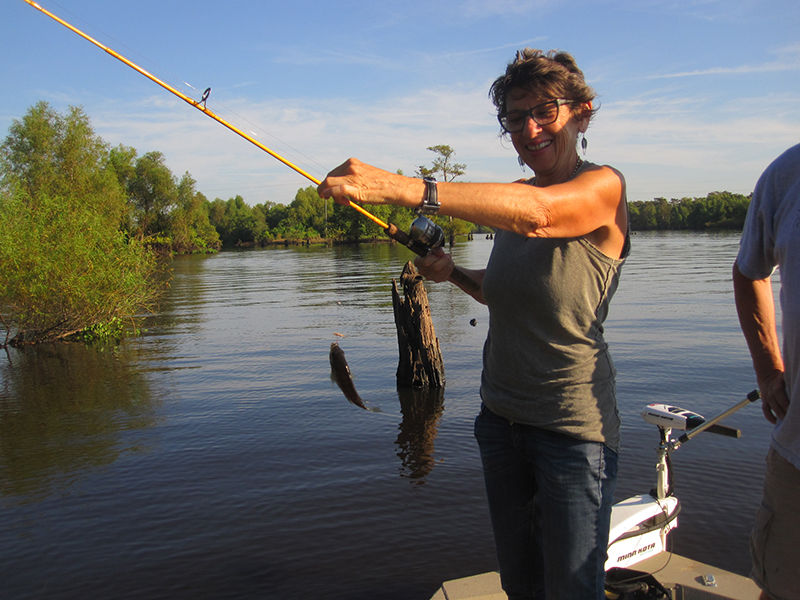Recently I was graced to travel to Lafayette, Louisiana, and spend the better part of a week with some of the good people of the bayou.
Father Sam Fontana of St. Joseph Catholic Church in Rayne brought me there. The night before I flew out, he told me, “I need to visit the bishop tomorrow, then make a bread pudding.”
Now that’s a priest!
As you may know, the French-speaking Acadians (from which the word Cajun is derived) were expelled by the British from Nova Scotia in 1755 and made their way to southern Louisiana. Along with the Indians, Africans, Creoles, Frenchmen and Spaniards who lived there, they contributed to produce a rich historical-cultural gumbo that has evolved over the centuries.
Cajuns are fiercely proud of their culture and way of life. Wary of outsiders — “If it’s tourist season, why can’t we shoot ’em?” read one bumper sticker — they were nonetheless hugely welcoming, generous and hospitable to me.
The original farm-to-table folks, Cajuns are also passionate about their food. At one glorious home-cooked dinner I had shrimp étouffée, corn maque-choux and a Jean Lafitte Ginger Ale Swamp Pop. One Lafayette resident enthusiastically described a breakfast slider consisting of a deep-fried boudin ball, a slice of bacon and a biscuit, all smothered in Steen’s Pure Cane Syrup. I stayed at an Airbnb in St. Martinville owned by Rien Fertel, author of “The One True Barbecue: Fire, Smoke and the Pitmasters Who Cook the Whole Hog.”
Cajun men cook as much and as well as the women. Father Sam and his brother Vince will be entering the gumbo cook-off fundraiser for St. Paul the Great Academy again this year. Apparently, the best jambalaya in Vermilion Parish is made by the Indian Bayou volunteer fire department. And, on a sunrise tour of the Atchafalaya Swamp, the boatman nimbly skirted cypress stumps, spotted alligators and spoke of the picante sauce he’d made to go with the gallon Ziploc of frogs’ legs a friend had just given him.
During my stay, I visited the Jungle Gardens at Avery Island, home of the Tabasco pepper sauce factory and fortune. I tramped to the Longfellow-Evangeline State Historic Site on the Bayou Teche. (Longfellow’s 1847 epic poem “Evangeline” is about a love affair doomed by the expulsion of the Acadians from Canada.) In downtown Lafayette, I ducked in to pray at the Cathedral of St. John the Evangelist, and marveled at the Cathedral Oak, by some accounts the second biggest oak tree in the U.S. (its circumference has been reported at 29 feet 6 inches tall).
But the heart of my visit was the “Acadiana Encounter” spearheaded by Father Sam and modeled after the lay movement Communion and Liberation’s “New York Encounter” held in Manhattan each year.
“The first annual Acadiana Encounter,” the flyer explained, will “explore topics such as a growing Acadiana, the tension of violence in the country, mercy in our community, the erosion of the coastline.”
The event ran from Friday evening through the “song and celebration” of a trio of Cajun musicians Saturday night. From start to finish — and to my inexpressible delight — it emblemized the spirit and theology from which I write this column: namely, that the mark of the follower of Christ is a wide-ranging curiosity, a sense of wonder and mystery and a profound love of place.
The encounter kicked off with “Poetry: A Word Which Opens the World,” a panel of three female academics who discussed the work, among others, of Wendell Berry, Richard Wilbur and Naomi Shihab Nye. Saturday dialogues included “Race and Media in a Culture of Confrontation,” “The Changing Culture of Human Sexuality” (during which a retired wetlands manager choked up as he shared that his third child is transgender), “The Face of God is Mercy,” and “Land’s End: The Erosion of Louisiana’s Coastal Cultures” and “Acadiana’s Changing Face and Steadfast Heart.”
I counted it as a great honor to have been invited from Los Angeles to deliver a talk called “The Choice of Fire: A Writer’s Vocation.”
Clearly, we are famished for real conversation. There were lively discussions around the food table, people jotting notes and exchanging contact info, laughter, tears and amazed exclamations of “Why don’t we have more of this?”
Always, to step outside the lines is a risk. To try something that’s never been done before. To include an “outsider.” To open a dialogue about the issues that drive our lives and about which we tend to remain strangely silent — race, sex, the poetry of our souls, our longing to encounter Christ: those are things requiring the heart of a warrior.
May we all increasingly encounter Christ: in our food, our flowers, birds and trees, our neighbors, our bayous and our city streets.
May Father Sam’s great adventure plant a seed in every Catholic heart.
And God may not play favorites, but I personally am going to pray that Father Sam and his brother win that gumbo cook-off.
Heather King is a blogger, speaker and the author of several books.

